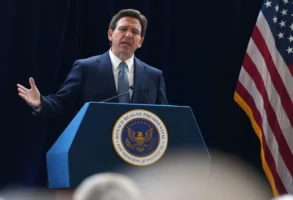
Published March 15, 2021
With last week’s introduction in Congress of the misleadingly named Civics Secures Democracy Act, we are headed toward an epic clash over the spread of uber-controversial pedagogies — Critical Race Theory and Action Civics — to America’s classrooms. I don’t know whether the country will wake up to the danger of this legislation before or after it passes. Sooner or later, however, the truth will out. When it does, the culture war will have merged with K-12 education-policy disputes to a degree never before seen.
Because this new legislation is a backdoor effort to impose a de facto national curriculum in the politically charged subject areas of history and civics, the battle will rage in the states, at the federal level, and between the states and the federal government as well. The Biden administration’s Education Department will almost certainly collaborate in this attempt to develop a set of national incentives, measures, and penalties that effectively force Critical Race Theory and Action Civics onto states and localities. The likelihood of education controversies moving from third-tier to first-tier issues in federal elections has never been greater.
The Republicans who have co-sponsored the “Civics Secures Democracy Act” in the Senate (John Cornyn) and the House (Tom Cole) have been hornswoggled and hogtied into backing legislation that is about as far from conservative as a bill could be. It should be said in extenuation of their decision that the bill is careful to bury its true ends under anodyne jargon. You have to know a lot about Action Civics, for example, to understand that this bill is designed to force it onto the states. Most conservatives don’t even know what Action Civics is, much less understand its misleading jargon. The very term “Action Civics” is a euphemism for political protests for course credit, something close to the opposite of a proper civics course. That’s one reason why the “Civics Secures Democracy Act” is so egregiously misnamed.
There have, of course, been many important education battles in our time. The conservative movement was founded by William F. Buckley’s 1951 book, God and Man at Yale, an early attack on the secular socialism of the university. Cultural issues remained important to movement conservatism, yet the focus soon turned to politics and policy in the ordinary sense. The 1960s gave birth to a series of intense cultural battles, with universities as epicenters of controversy. Yet many of the clashes were over the war and the draft. For the most part, the federal government kept out of higher-education controversies in that era.
The battle over the teaching of Western Civilization at Stanford in 1987 kicked off a decade-long culture war over multiculturalism and political correctness, the ancestor of our clashes today. At this point, education battles began to seep into national politics, especially via the actions of Education Secretary William Bennett and National Endowment for the Arts Chair Lynne Cheney. Even so, universities incubating what eventually was to become today’s woke culture were largely insulated from government intervention by academic freedom.
The Obama administration pushed the K-12 Common Core on states, but the founders of Common Core made a calculated decision to omit the controversial subjects of history and civics from that effort. They understood the dangers of mixing education policy with high-intensity culture war issues. Now, however, in an attempt to complete the creation of a de facto national curriculum, the top supporters of Common Core (including, sad to say, a few conservatives) have formed an alliance with the top national advocates of Action Civics and Critical Race Theory. The result is what we see in the “Civics Secures Democracy Act” — and what we’re likely to get very soon from the Biden administration — a de facto national curriculum in Action Civics and Critical Race Theory. And all of this is happening as woke culture is spilling out of the campuses and into the wider society. Once the reality of this new push for education “reform” comes into the open, we will see the culture war merge with the details of federal education policy in unprecedented fashion.
What does the not-so-civic “Civics Secures Democracy Act of 2021” actually do? Above all, it appropriates $1 billion for federal grants to support K-12 curriculum development, teacher training, and research on the K-12 teaching of history and civics. Sounds good, if expensive, until you look at the fine print. Priority for grants is decided according to two basic criteria.
First of all, priority goes to grants that support “evidence-based practices.” The bill goes on to list these supposedly evidence-based practices, which are essentially the menu of troubling teaching techniques favored by the movement for Action Civics (Bill Page 5, Line 16-Page 6, Line 5). These are the very same practices I have written model legislation to block at the state level. They include: 1) directing teachers to discuss current social and political controversies in class; 2) out-of-class political protests and lobbying (nearly always for leftist causes) for course credit (in the bill, called “projects” and “experiential learning”) and 3) internships with (invariably leftist) lobbying and advocacy organizations for course credit (in the bill, called “service learning”).
Programs in “media literacy” are also marked as a priority. These programs ostensibly warn students away from dangerous conspiracy theories. In practice, however, they discourage students from looking at conservative sources and hold up mainstream media fact-checkers (largely left-biased) as sources of ultimate authority. Essentially, “media literacy” programs favored by advocates of the new civics inculcate the Democratic Party’s position on “fake news.”
The upshot is that the lion’s share of this billion-dollar jackpot will support mandatory leftist protest, lobbying, and indoctrination, while supporters of traditional civics and history will be frozen out.
The second criterion for priority applies to grants that “improve knowledge and engagement” among “traditionally underserved” students, as well as grants that promise to “close gaps in knowledge and achievement among students of different income levels, racial and ethnic groups, and native languages.” This gives the inside lane to Critical Race Theory, while largely disqualifying those who believe that American history and civics can unify if presented in a broadly similar manner to students of all incomes, races, and ethnicities.
That may sound too strong. Keep in mind, however, that the main public justification for the controversial, Critical Race Theory-based “Culturally Responsive Teaching and Leading Standards” just approved in Illinois was that they would be more likely to attract minority teachers and more likely to appeal to minority students, thereby closing achievement gaps. Yet those standards force teachers to call America systemically racist, affirm the “fluidity” of gender, “mitigate” their Euro-centrism and whiteness, and substitute activism for achievement when grading students. Finding creative ways to present traditional civics to minorities is one thing. Teaching radical activism is quite another.
Yet the movement for Critical Race Theory in education essentially presents itself as fulfilling both priority criteria for grants listed in this bill: “experiential” advocacy projects designed to appeal to minority students. We are talking about Black Lives Matter protests outside of police stations for course credit. And the grants will be disbursed by President Biden’s Education Department, sure to be staffed by left-leaning bureaucrats who believe — as does the president — that our country is “systemically racist.” Put together the priority criteria and a Democrat-controlled Department of Education and you will see a tremendous number of grants going to Critical Race Theory-based political advocacy programs, all under the label of “civics.”
Critical Race Theory, of course, is antithetical to the classically liberal principles upon which our constitutional republic rests. Teaching it is actually a form of anti-civics. Yet that is what hundreds of millions of dollars disbursed by the “Civics Secures Democracy Act” is going to be used for.
So, the “Civics Secures Democracy Act” is a massive boondoggle in support of politicizing students and teaching them to trade away equality and individual liberty for identity politics and the redistribution of . . . well, pretty much everything. But there’s more. On top of its billion-dollar lure, the bill revamps a key national test as a backdoor way of imposing a de facto national curriculum on the states.
The National Assessment of Educational Progress (NAEP), famous as “the nation’s report card,” is the national test that allows us to tell how well the states are doing at teaching basic knowledge and skills. NAEP allows us to see that, whereas America’s reading and math scores had once been headed up, Common Core has brought them down. Yet NAEP was never intended to create a national curriculum. On the contrary, NAEP was deliberately designed to make it difficult or impossible to link its results to state or local curricula. If anything, by revealing the failure of Common Core, NAEP has already discredited the very idea of a de facto national curriculum.
For decades, however, some have dreamed of using NAEP as a way of imposing what amounts to a national curriculum on the states. If NAEP could be aligned to specific history or civics standards, and administered in such a way as to facilitate state-by-state comparisons between results, the test could effectively force a federal curriculum on states and localities. Variable state NAEP results could then be tied to the awarding of federal grants. State-by-state rankings would have a profound effect on parental satisfaction with schools, and thus on migration in and out of state by both individuals and businesses.
The Civics Secures Democracy Act of 2021 is very much part of an effort to use NAEP to force a revisionist history and civics curriculum down the throats of unsuspecting states and localities. The bill would increase and regularize NAEP assessments in history and civics, facilitate state-by-state comparisons, and condition grants on the willingness of a state to participate in the history and civics portions of the test on a regular basis. Grant renewals would also be conditioned on statewide performance on the reorganized NAEP.
Combine this with the ambitions of the new, supposedly bipartisan, Educating for American Democracy (EAD) initiative (aptly described as a “Trojan Horse for Woke Education”). The leftist leaders of EAD, who just happen to be the chief public backers of the Civics Secures Democracy Act of 2021, issued a draft report on implementation that I have seen, but that seems not to have been released to the public in final form. That draft report calls for NAEP to be redesigned to align with EAD. This would be an inexcusable national power-grab and an affront to the proper purpose of NAEP. It’s clear, however, that this is exactly what the bogus leftist “civics” coalition wants. (For a new report by the Heritage Foundation critical of EAD and its national ambitions, go here. For more critiques of EAD, go here and here.)
In effect, we are looking at an effort to impose a new federal Common Core in the politically explosive subject areas of history and civics. Worse, the program in each of these areas does more than just lean a bit toward the left side of the political spectrum. Instead, it sharply breaks with fundamental assumptions in American education, first by promoting illiberal Critical Race Theory, and second by turning what should be a politically neutral classroom into a training ground for leftist advocacy and lobbying.
All around us, the culture war has broken the bounds of the university and spilled into our day-to-day lives. Conservatives and traditional liberals are rightly up in arms about the woke assault on our most fundamental freedoms, extending to inculcating guilt and shame in elementary-school students for the color of their skin. The Democrats in Congress, in league with the Biden administration and the leftist Action Civics movement, are about to supercharge this culture war by injecting it into the heart of federal education policy. Whether sooner or later, this is destined to become the greatest education battle of our lifetimes.
Stanley Kurtz is a senior fellow at the Ethics and Public Policy Center.








